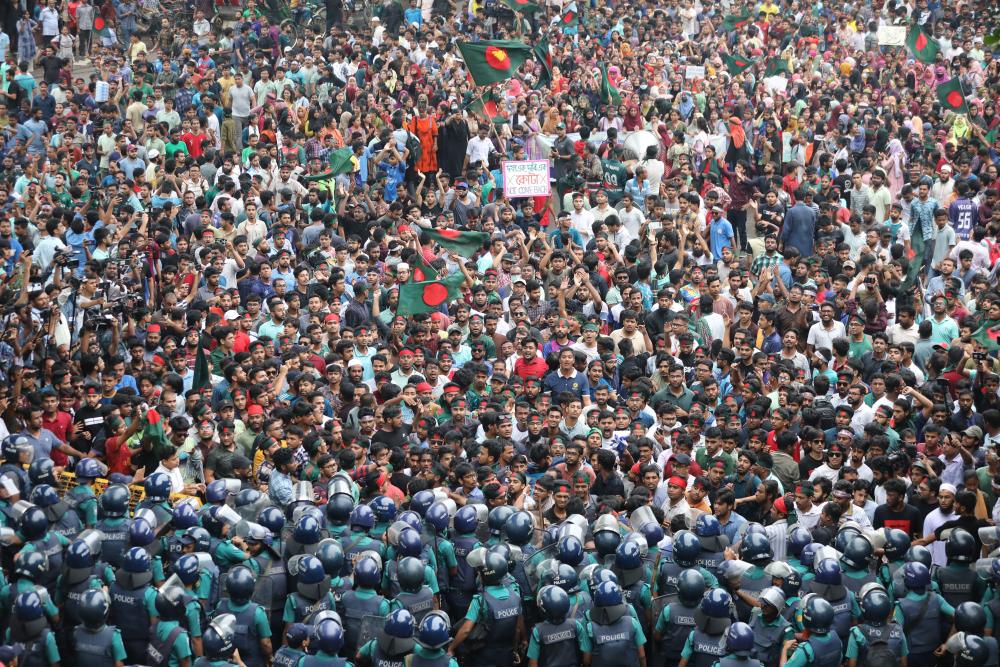The 2024 uprising in Bangladesh: More than just quota reform


SOAS student Md Rafid Hossain explains the Bangladesh students’ movement for the reform of the quota system in government jobs, and why violent repression from the state has caused it to escalate into a broader demand for accountability and justice.
‘Is it a crime to seek a job?’
"Why did they shoot my son? He wasn’t attacking anyone. Is it a crime to seek a job?"
These are the heart-wrenching words of Monowara Begum, the mother of Abu Sayed, a student who was killed during the quota reform movement on July 16, 2024. Monowara was sobbing uncontrollably as she spoke.
In two videos verified by Amnesty International, at least two police officers shot rubber bullets with 12-gauge shotguns at Abu Sayed from across the street. The 25-year-old student held his chest after being hit as the officers fired two more times from about 15 meters away. Sayed, who did not pose any clear threat to the police, attempted to protect himself with a stick. Moments later, he collapsed and died.
According to various news sources, more than 100 people have been reported dead so far.
The form of the movement we are witnessing in Bangladesh is unprecedented, at least in my lifetime. We saw a massive movement demanding quota reforms in 2018, but this time it has taken on an even larger scale. This article aims to explain the reasons behind it.
The quota and the corruption scandal
In 2018, students took to the streets demanding quota reforms. In government jobs, 56% of positions are reserved under various quotas, including 30% for the descendants of freedom fighters from the 1971 War of Independence. In a country with high unemployment, the primary demand of the student community was to reduce the percentage of these quotas. Under the pressure of student protests, the Prime Minister eventually abolished the entire quota system.
However, in June 2024, the High Court suddenly ruled that the 2018 government order canceling the 30 percent quota for freedom fighters' descendants in government jobs was illegal. On July 1, protests began again, initially peacefully in public universities across the country. Then, a significant event occurred. On July 7, a Bangladeshi investigative journalist revealed that for more than 12 years, questions for the Bangladesh Civil Service (first-class government jobs) and other government job exams have been consistently compromised. The regular leakage of BCS exam questions was particularly shocking.
The BCS exam is extremely popular among students. From 2014 to 2019, I was a student at Dhaka University and myself took the BCS exam once. There was a perception among students that while question leaks sometimes occurred for second-class government jobs, the BCS exam was generally fair. As a result, many ordinary students, who did not benefit from quotas, relied heavily on the BCS exam. They believed that even if 56% of the jobs were reserved for quotas, they could still compete for the remaining 44% based on merit. Now, they realize that even within that 44%, many positions are being taken through unethical means.
On July 13, a detailed report on the BCS question leaks was published, which incited intense agitation among students. On July 14, the High Court released its official decision to retain the 30 percent quota for freedom fighter descendants.
The escalation of the movement
From the 14th onward, the movement started becoming intense and reached an unprecedented state. We saw a quota movement in 2018 as well, but today's movement has grown so large due to the accumulated anger of the student community. Since 2014, an illegitimate government, maintained through questionable elections, has provoked anger with its widespread corruption, disappearances, money laundering, rising inflation, soaring commodity prices, and most importantly, the stripping of voting rights, dehumanizing an entire population. This collective anger is now being expressed through the movement.
We see that not only students from public universities but also those from private universities and colleges have joined this movement. Whenever there is a student protest for any legitimate demand, the government claims that it is a conspiracy by anti-independence elements or opposition parties. By making such claims, they create a justification for brutally suppressing the movement. Then, the government’s student wing, Bangladesh Chhatra League, starts attacking the protesters.
This time is no different. Ordinary students are being attacked by the police and Chhatra League, resulting in the deaths of several protesters. The movement has spread across Bangladesh. To control the situation, the government has shut down internet services to prevent the protesters from coordinating and to keep news of the movement from reaching the outside world.
The police have become so reckless that they have even paraded with a dead body of a protester on top of their vehicle to instill fear. Such is their audacity.
As of the latest reports, the Bangladesh government has imposed a curfew and deployed the military.
The government claims they are now ready to reform the quota system. However, merely reforming the quota system will not resolve the current situation. The movement is now about seeking justice for the cold-blooded killing of protesters. It is also about reclaiming the dignity that has been taken away from the people for years.
Before the internet blackout, the demands of the protesters on social networks indicated that when so many people had to return as corpses while trying to achieve their rightful demands, the issue was no longer about quotas. Now, the demand is for the resignation of the government or its leader.
The views and opinions expressed in SOAS Blogs are solely those of the respective authors and do not necessarily reflect the views of the organisation or act as an endorsement.
About the author
Md Rafid Hossain is a Bangladeshi student currently pursuing a MSc Development Studies at SOAS, University of London. He completed his undergraduate degree in Economics from the University of Dhaka. He has a keen interest in politics, social psychology, and literature.



